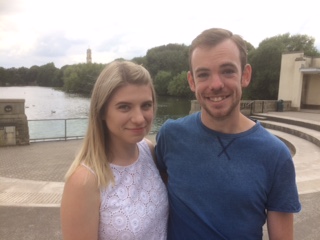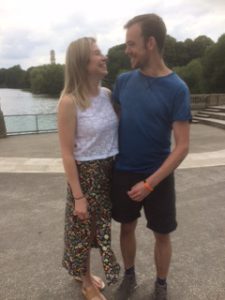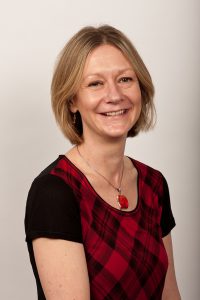
July 23, 2018, by Emma Rayner
Young stroke survivor returns to University to finish degree
This Wednesday 25th July stroke survivors from across the region will be sharing their stories and finding out about the latest stroke research in a special workshop organised by the University’s Stroke Research Partnership Group. The event is a unique opportunity for survivors and their carers to meet medical researchers and help shape the direction of future research into the diagnosis, prevention and treatment of stroke. One of them, University of Nottingham engineering student David Noblet, has shared his personal story about how stroke can happen to anyone, even the very young, at any moment…
David Noblet was just 27 when he had a stroke. Father of two girls, he was in the third year of his Mechanical Engineering degree at the University of Nottingham when he started experiencing headaches over a period of 3-4 days. Thinking nothing of the headaches, and taking paracetamol as pain relief, David did not consider it was anything serious. That is until in the early hours he woke up to find his left arm felt weak. He thought he had slept on his arm awkwardly. His partner, Paulina Franus, was woken up by his restlessness and when she asked what was wrong she found he couldn’t answer. Becoming concerned, Paulina decided to call David’s father who lives nearby. When she described the symptoms, David’s Dad urged her to call an ambulance, and he went straight round. The ambulance arrived in 20 minutes. The paramedics took David to the Queens Medical Centre in Nottingham where he had a scan and he was then transferred to the City Hospital. A blood clot in his brain had turned into a bleed.
David remembers shouting at one doctor and was eager to know when his MRI scan would be done. As an engineering student, he was naturally interested in technology. He actually felt excited about being in an ambulance for the first time and in awe of the MRI scanning equipment.
But it was the start of a long three week stay in hospital. He felt ready to be discharged after two weeks, but his parents were keen for him to stay as he had fallen in hospital because his left leg had given way when he tried to stand.
David said: “I had just started my third year and was due to graduate in June 2018. My Dad knows the Course Director and contacted him to let him know what had happened. He was really helpful and totally supportive. I had been working on an interesting project designing an exhaust manifold for an engine and fortunately any coursework I’d already completed was still accepted towards my degree”.
David says he feels very lucky to have had all the support he received after his stroke to help with his rehabilitation; this included being offered 50% off his gym membership at the David Ross Sports Village on University Park.
David will be taking up his Mechanical Engineering course again in September. “I feel apprehensive about going back to university” he said, “but tremendously excited to be resuming my studies. I have completed a couple of exercises online to get re-accustomed.”
Paulina recalls; “During the first few months after his stroke, David was really tired and would need to sleep on and off during the day. When he feels tired now, he has something to eat which helps to combat his fatigue.” David added that he takes magnesium supplements which seem to counter his tiredness.
David remains very positive and determined: “I am hungry for rehabilitation and feel lucky to have the support I’ve received. This even includes having some personal training from my Dad’s neighbour who is former European welterweight champion, Errol McDonald”.
David and Paulina are members of the Nottingham Stroke Research Partnership Group (NSRPG), a group of stroke survivors and carers who work with stroke researchers from the University of Nottingham. David contacted Helen Taylor, the NSRPG coordinator, to find out more about rehabilitation research as he felt because of his age his experience was quite unique, and he had a strong sense of drive to improve his recovery and understand more about stroke rehabilitation research.
David also felt like he could give something back by fundraising £475 for the Stroke Association and participating in a 5km sponsored run in which he walked.
Dr Rebecca Fisher (Stroke Association Senior Lecturer, School of Medicine) co-chairs the stroke partnership group added: “David is an inspirational person. We were delighted to welcome him to join the group and he will bring an important perspective to our work. I’m impressed by David’s bravery and determination and it’s fantastic that he will soon be returning to his studies”.
NSRPG’s Stroke Research Workshop runs from 10am to 2.30pm on Wednesday 25th July in the Clinical Sciences Building at the City Hospital in Nottingham. It is open to all stroke survivors and their carers to learn about the latest research studies and where researchers had the opportunity to pitch their projects, covering topics such as Transient Ischaemic Attack (TIA), depression and confidence after stroke.
The workshop is free and booking is available via Helen Taylor, Administration Coordinator, Stroke Research Partnership Group on 0115 82 30246 or email h.taylor@nottingham.ac.uk
No comments yet, fill out a comment to be the first



Leave a Reply